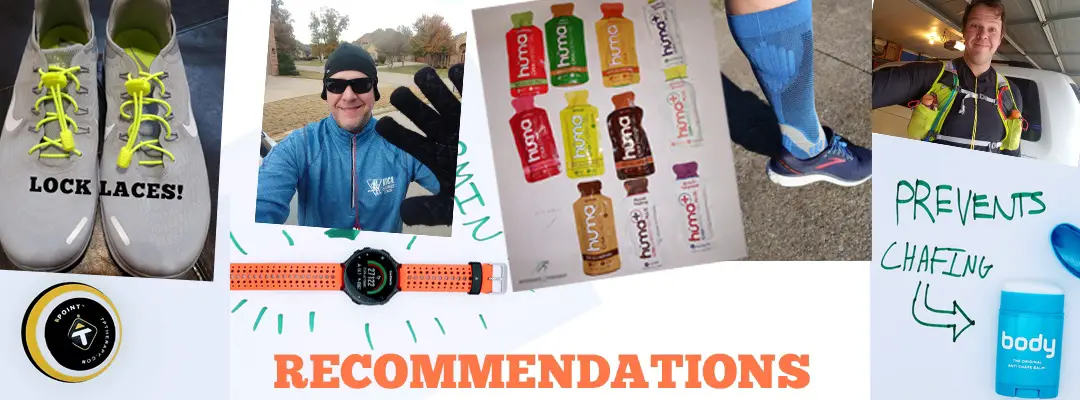You’ve got 13 miles ahead of you and that’s a great distance. It’s long enough that you’ll be challenged but not so long that you’ll have to give up everything else in your life to train for it. You do need to be prepared, however, as a half-marathon is certainly no cakewalk.
So… wondering how to survive your first half marathon race? 15 best tips to get to the finish line are coming right up!
Tip#1 – Don’t buy new shoes
It’s tempting to get a new pair of shoes for the half-marathon but this is a big mistake. You haven’t broken them in yet, you see, and this can be a problem after a few miles. Stick with the shoes that you’ve been training in already. They’ve still got plenty of miles left in them and they won’t turn on you when the going gets rough.
Tip#2 – Expect and prepare for blisters
When you are running a distance of 13.1 miles (21K) an injury such as a blister can and will occur. The best thing that you can do is to be prepared. Petroleum jelly can help and you’ll want to have some bandages on hand so that you can wrap up those feet if you need to and get back into action.
If you have the right pair of socks and the right shoes, you can minimize getting blisters. In fact, I’ve run over 18 long-distance races wearing Balega socks and Brooks Ghost running shoes (see my recommendations page) and haven’t contracted any type of blister.
Tip#3 – Don’t eat or drink anything new
Eating or drinking something new before the race can be a recipe for disaster. These events often give away free energy drinks and snacks that your body might not be used to. Eating or drinking these is a mistake.
That energy drink could speed up your heartbeat and make you dehydrate faster and that food might feel good in your stomach after another couple of miles. Stick with the food and drink that you’ve trained with and you’ll be much better off.
What are some of the best foods for runners? Find out here –> What are the best superfoods for runners?
If you’ve trained with energy gels make sure you pack them the night before your half marathon race to ensure you will have them during the race. How many energy gels should I eat during my half marathon race?
Tip#4 – Know your motivation for running
Understanding your motivation for running the half-marathon in the first place can really help you to keep motivated. Ask yourself why you want to run it and if you are honest with yourself, knowing your own motivation can keep you going until the race has been run.
Click here if you’ve recently lost your running mojo and you need it to come back.
Tip#5 – Spread out your support team
Make sure that you have friends spaced throughout mile markers of the marathon. Knowing who you’ll see next and that they are armed with snacks and drinks to help you to succeed can keep you motivated mentally and recharged physically.
Tip#6 – Conserve energy
Don’t worry about hitting super bursts of speed early in the race. Focus instead on a slow and steady pace and save that inner fire for the last stages of the race. That’s where you are going to need it the most, so don’t waste your energy too early.
Tip#7 – Get plenty of sleep that week
Sleeping the night before the race is not always the easiest thing, but if you’ve got plenty of sleep during the week then you will still have enough energy to run the half-marathon, even if you can’t enough sleep the night before.
Sleep has so many benefits for active individuals – especially runners! Here are some tips on catching a good night of sleep.
Related: How To Run Safely At Night?
Tip#8 – You don’t have to stop at every water station
Try to hydrate about the same amount that you’ve been doing during your training. Just because there is a water station, it doesn’t mean that you have to always stop there. Drinking more water than you trained can mean extra bathroom breaks and even an upset stomach, so stick to your standard level of hydration.
If you’ve brought along your trusty hydration source such as a hydration water pack, then you don’t need water aide stations. Should you carry water for a half-marathon race?
Tip#9 – Don’t cut loose until the crowd thins
When you first start the marathon run there are a lot of other people there. This means that you are going to expend extra energy weaving through the crowd if you try to get ahead too early. A better strategy is to wait until they thin out, which usually occurs in the second mile. That way you can use your energy more efficiently when you decide to pick up the pace.
Tip#10 – Learn the course in advance
You can’t just go into a half-marathon without knowing the course. There will be curves, elevation changes, and all sorts of variables that you need to know about if you are going to make yourself a proper training regimen. To learn the course in advance and you’ll be better prepared for it. It’s just good sense.
Tip#11 – Never run on an empty stomach
You’ve been training for this marathon a while and the odds are that you eat a light meal before you do any kind of distance running. Don’t skip that pre- half marathon/marathon meal and don’t overdo it either. That food will give you a nutritional boost that you’ll be very glad for after you’ve covered a good bit of distance.
For a detailed post about what you should eat and when you should eat it before your half marathon race, check out:
What Should I Eat Before My Half Marathon Race?
Tip#12 – Take a warm-up jog before the race
Before the half-marathon, it’s a good idea to take at least a half-mile jog in order to get your body limbered up and ready to go. While it sounds counterproductive to add more distance to the running you’ll be doing that day, in reality, your body will be revved up and ready when the half-marathon begins.
Trust us on this. That half-mile jog is really going to help.
Tip#13 – Keep your mind occupied
When you get about halfway through the race it can start to feel like the whole course is uphill. Especially so when you get two-thirds into it. You can combat this with a little mental trickery. Try collecting letters from signs that you pass to complete the alphabet. Try focusing on the rhythmic sound of your footfalls.
Keeping your mind occupied during this time is crucial and it will help you to look past the pain so that you can see the glory of your achievement!
Tip#14 – Pace yourself during training to build endurance
Speed is great but endurance is really what you are going to need through those miles. Train yourself to run at a slow and steady pace so that you can build endurance. Once you’ve got endurance on your side then you’ll have enough energy to mix things up with sprints when you need them.
Fast is good but it won’t win you the race if you don’t have the endurance. Pace yourself and soon you will own it.
Adopting an 80/20 training strategy will help you when it comes to running your race. Check out the 80/20 strategy and see how it can work for you during your runs and races.
Tip#15 – Stick to what you trained for
Another common mistake is getting too excited about the crowd or too competitive with the presence of the other runners, followed by a deviation from the approach to the race that you trained yourself for. Sprinting too soon just to show off or out of panic that you’ll end up last is a mistake. If you’ve trained yourself to run slowly and then start adding in sprints at the 6th mile, then stick to that.
You’ve been training a long time for this and so you know what to expect from yourself and deviating from this can strike a blow at your morale when you find yourself running out of energy too soon.
Trust your training and stick with what you know.
Tip#16 – Don’t chase other runners
When new half marathoners start their race and a good majority of them come flying off the starting line traveling at paces they didn’t train for. They sputter out at about the 2nd or 3rd mile. Don’t be one of these runners. Like Tip #15 says, Stick to what you trained for. If another runner passes you, especially early on, resist the urge to chase them. Odds are that they are going to be running the half marathon at a faster pace. Also, they probably trained at a faster pace.
Tip #17 – Start out slow and finish fast
One of the biggest tips I offer all of my clients is this tip. Start off slow and easy. Give yourself time to reach your cruising goal half marathon pace. Normally at the beginning of bigger races, you will get stuck in the muck of people. A good way to avoid this is to run in a corral that is just a little slower than you or maybe 2 pace levels slower than you, and then get in the front near the starting line.
Related: What Is A Running Race Corral?
Tip #18 – If you can’t run the whole half marathon – switch to run/walk intervals
If you wanted to run the entire half marathon, then by all means give it go. It’s sometimes nice to have some sort of backup plan if something goes wrong in your first half marathon race. I like to have a simple backup plan, like one of the following:
- Switch to: run 4 minutes walk 1 minute
- Walk uphill and run downhill
For a detailed dive into the run/walk method of running, check out this post:
How to use the Run/Walk Method – A Complete Guide
Tip #19 – Complete Vs. Compete
One of my other favorite tips to give first-time half marathoners is to simply have a goal of completion in mind (the same goes for the marathon as well). It is perfectly fine to have a goal race pace and goal finish time in mind. Just don’t reach too far beyond your means for the first half marathon race.
After you’ve completed your first half marathon and you’ve fallen in love with the long-distance (sometimes it’s a love-hate thing with running), sign up for another half marathon and start pushes yourself a little more, and compete.
Tip #20 – Don’t forget anti-chafing cream
Has the inside of your legs ever felt like someone has rubbed sandpaper on them after a long-distance run? That my friend is chafing and it happens when the skin on skin contact rubs together mixed with salt crystals and leaves you red and raw to the touch. Anti-chafing cream simply adds a lubricating barrier between the two surfaces so that you don’t chafe yourself out of a race.
The anti-chafing cream I recommend is on my recommendations list and on my half marathon checklist.
Tip #21 – You need a checklist of all items for your half marathon race
Being prepared for your half marathon race day will help ensure that your race day will come and go with ease. Simple habits, such as laying out all of your gear the night before your race is huge. I’ve prepared a perfect half marathon checklist (you can use it for marathons as well) for race items and post-race you should consider bringing with you. Also, gear check bags are an easy way to keep your post-race kit safe and secure when you race.
Bonus Tip #1 – Visualize your success
After you’ve mozied on down to the correct starting coral for your first half marathon race, take a few minutes to visualize your success. Here is how to do it:
- Close your eyes
- Rock back and forth on your feet (side to side)
- Breathe in energy
- Exhale anxiety
- Listen to your breath – over and over again
- Visualize the race before you (with eyes closed)
- See yourself crossing the finish line
- Try to grasp those feelings of how you’re going to feel when you cross the finish line.
- float around in these thoughts for a few more moments
- smile (eyes still closed)
- open your eyes and prepare yourself for success
The first time I crossed the half marathon finish lines I was embellished with feelings of victory and joy (and that somehow I got 2nd in my age group – small race).
Related: What To Expect Running Your First Half Marathon – Mile by Mile (mental and physical)!
Some final words
We hope these tips will help you to keep the focus and determination that will get you all the way to the finish line. Remember, this is just as much a mental exercise as it is a physical exercise. It’ll be tough, but if you train for it and keep your focus then you will make it to the finish line.
Just stick to your training and don’t worry about those other runners until you are getting close to the end. Don’t worry… you’ve got this!
Are You Looking For A Half Marathon Training Schedule?
12-week/15-week beginner half marathon training plan (free sign up required)
8-week beginner half marathon training plan
8-week intermediate half marathon training plan (easily run a 5K)
4-week advanced half marathon training plan (already run 6+ mile long runs)
Half marathon walking training plans complete with pacing charts
| Help support me and subscribe to my YouTube channel. YouTube video - 30 ways to make your runs less painful! Coach Scott's Credentials:
|
To sign up for a FREE half marathon training schedule, log sheet, and pace predictor CLICK HERE.

Recommended gear for runners
Connect with me:
| facebook.com/BeginnerToFinisher/ |



2 thoughts on “21 Tips To Help Ensure You Survive Your First Half Marathon Race!”